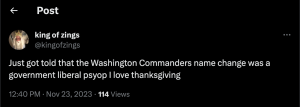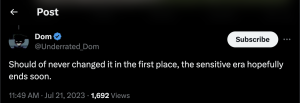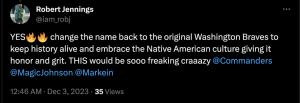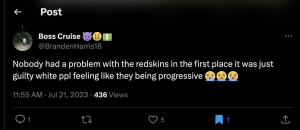32 The Washington Commander’s Name Dilemma (Anti Fandom)
Clement Chibueze
Introduction:
When it comes to anti-fandom, it is expected that as much as texts or certain subjects are consumed, whether negative or positive based, it would also show the responses of fandoms and the dynamics between interest and disinterest regardless of shown or unshown allegiance (Gray, 2005, p. 25). The thesis statement that will be spoken about during this essay is on the topic of the NFL’s Washington Commanders changing their name back to their former name. This thesis will also show how the audience reacts to it from the anti-fandom standpoint. The timeframe will be between July 2023 to December 2023 and the interaction from the audience will be taken from the social media platform, Twitter or X. One thing to outline specifically is that for fandom and anti-fandom to be understood, there needs to be awareness regarding the relationship between the two concepts. According to Henry Jenkins’ chapter on fandom and participatory culture, it explains that the relationship between those two topics have a “binary opposition” or a ying-yang effect, implying that they live to complete each other in every topic (Jenkins, 2018, p. 16).
When it comes to the conversation between the topic about the name change of the Washington Commanders, one thing that will be shown and outlined throughout this essay will be the lines between a fan and an anti-fan, which will blur very often. In Jonathan Gray’s chapter on the different types of anti-fandom, he explains that visceral hate-watching is prominent regardless of an individual’s feelings towards a certain topic (Gray, 2005, p. 38). This is true in the case of Commander fans because regardless of their views and their opinions regarding certain topics that have to do with team and or management they still represent and express their devotion to their team no matter what.
In this academic essay, the topic of the name change of the Washington Commanders will be broken down into an overview of what allowed this conversation to come to place in the first place, the reactions of the team as well as the management to the topic, what fans have to say regarding it as well as the direction the majority of the fans are taking, and the role the fans have to play in context to anti-fandom. Due to this word’s terrible history, the term will not be used in any manner since it is derogatory.
Overview of the Name Change of the Washington Commanders:
When it comes to the overall situation that occurred, this did not just start in 2023, or during the pandemic, but has been a constant conversation for several years of the NFL’s duration and playing time. According to James Bingaman’s article, in context with the history of the term, the team’s previous name has been deemed as one of the most negative racial slurs to the indigenous community (Bingaman & Leach, 2023, p. 355). However, it took over 80 plus years for them to change their name (Bingaman & Leach, 2023, p. 355). What made it come into place was the unfortunate event of George Floyd being murdered by the Minnesota police while also being unarmed (Bingaman & Leach, 2023, p. 356). This caused for several corporations and organizations even outside the NFL to rebrand, show their support and love for black lives, and their awareness of social justice issues of other subjects as well (Bingaman & Leach, 2023, p. 356). Keeping in mind that in 2013, the team owner at the time strongly expressed that the name of the team will be never changed, but due to the current situation and or circumstances, there was a pressure for the team organization to do “something” (Bingaman & Leach, 2023, p. 356).
Leading up to the rebranding of the team, one of the biggest issues with the name, mascot, and logo was the imagery that it put on indigenous groups. Some people in the indigenous communities often feel that the use of derogatory terms, logos, and culture essentially paint the communities and individuals negatively rather than it being beneficial (Bingaman & Leach, 2023, p. 356). This led the Washington Commanders as well as the Cleveland Guardians to rebrand because of the backlash they were getting and the potential backlash the team owners knew they would obtain, especially in this crucial time of social justice awareness (Bingaman & Leach, 2023, p. 356). The Washington Commanders were known as the “Washington Football Team” during the 2020 to 2022 season with no form or remnant of their previous logos and branding, before becoming the Commanders in 2023. (Bingaman & Leach, 2023, p. 356). There are two sides to a coin and with the new name, there is/will always be a side taken by fans whether for or against. That piece on its own is what initially led the team and organization to think of changing their name.
The Reaction of the Fanbase to the Rebrand & Its Connection to Politics:
As spoken about earlier, as much as the names have been changed, some people believe it should not have, while others believe it should have been. A prime example of this would be when two different organizations had two different reactions to the name change of the Commanders. According to Fox 5 Atlanta, Native American Guardians Association (NAGA) accused the new Commanders owner of violating the civil rights of indigenous people and even sued the organization for almost 2 million dollars due to the damage the team has done (FOX 5 Atlanta, 2023). They explain that the new name is only suitable for oppressors and brings no benefit to the indigenous community because the previous name held traits that exemplify what it means to be a part of the culture (FOX 5 Atlanta, 2023). While on the other hand, the National Congress of American Indians (NCAI) expressed their strong resentment to the term because of the “denigration” it brings upon the individuals as well as the overall community due to stereotyping (Cox et al., 2023). The NAGA organization even accused the NCAI of not being a “tribal” organization that speaks for everybody in the indigenous communities (Durden, 2023). This shows the concept of “politics of against” because through this topic individuals, groups, and or organizations are showing that strong dislike or hatred for a certain subject, is able to build up heavy enthusiasm which can lead to activism or shown disregard for the subject (Barnes & Middlemost, 2021).
One thing that needs to be realized regarding the conversation of anti-fandoms in the majority of conversations is that there can be political-based topics that can be intertwined with it as well. Much like the examples given in the earlier paragraph, the two different organizations are witnesses of the name change movement, but they have perceived it differently potentially because of their stances and or opinions (on the political level). The article by Tyler Durden explains that on the surface level, it may seem that this is completely about sports, but something that should be kept in mind is the fact that “overly political stuff” is able to seep into what individuals see as “culture” (Durden, 2023). In the image shown, an individual explained that during thanksgiving, they were told that the name change took place based on liberal government-based “propaganda” to influence fans of the NFL and or the Commanders team1(King of Zings on X: “Just Got Told That the Washington Commanders Name Change Was a Government Liberal Psyop I Love Thanksgiving” / X, 2023). Ironically, that statement implied that fans and organizations are thinking this way, to an extent, subconsciously without really perceiving it that way.
Another aspect that influences the perception of anti-fans which might be subconscious to some and blatant to others, is the management of the Washington team. According to the Fox 5 Atlanta article, the NAGA organization accused not only the NFL franchise but the new owner, Josh Harris, for being a “billionaire owner” unaware of what Native American Culture truly holds (FOX 5 Atlanta, 2023). However, the decision to make changes to the name took place in 2020 while the new owner acquired the team in July 2023 (Durden, 2023). This also ties back to the fact that the “rival” group, the NCAI, were called the key reason on why indigenous people suffer cultural oppression because of their heavy fight to cancel the former name of the team.
Snark Fandom within the Team’s Community:
When it comes to snark fandom, one of the ways the author explained this term is through the example of junk food (Harman & Jones, 2013, p. 955-956). The reason behind the analogy given explains that people who eat and enjoy junk food are already aware of how bad it is for them, so they save themselves the mental stress and continue to take pleasure in it (Harman & Jones, 2013, p. 955-956). In relation to this and the subject at hand, it is safe to assume that a lot of individuals within the fandom, that find themselves heavily engaged with the Washington team, do not care what name they bear. Rather they care about the sports performance they make. The unfortunate thing about this is that human beings are more than okay with settling while being aware of the damage something can bring in any general topic. On the platform X, this is very prominent considering X is one of the biggest social media platforms as well as a recognized news “channel”.
A tweet-based example of this would be when an individual reacted to the potentiality of the Commanders changing their name. The individual was implying that it should not have been changed in the very beginning and that people are being sensitive for wanting it changed in the first place2(Dom on X: “@SaycheeseDGTL Should of Never Changed It in the First Place, the Sensitive Era Hopefully Ends Soon.” / X, 2023). Another example of this was when someone said, “Who cares what a XFL teams name is”. That example heavily shows the priorities in which the name change and “just football” stands in certain individual’s minds and opinions3 (☥ Mace 🇵🇷 on X: “@SaycheeseDGTL Who Cares What a XFL Teams Name Is” / X, 2023). The X user had implied through their mentality that there are bigger concerns at hand in football than changing the name of an “XFL” team (a minor football league in America).
Fan-tagonism through the Lense of the Commanders:
When it comes to the conversation of the “fan-tagonism” concept, it is defined as the struggles and tensions the partakers of fandoms go through either through the text or the producers of the text (Johnson, 2017, p. 396- 397). Although this particular concept or definition is mostly used with fiction-based subjects like TV shows or movies, it should be suitable enough to be brought up with the Commanders and their fans because it aligns with the definition. In the article by Derek Johnson, the author explains that even the concept of racist mascots in sports falls in line with fan-tagonism because it sheds light on how factors and or privileges like race, class etc. can alter and impact the topic of “Activist vs Authentic” (Johnson, 2017, p. 397). The incident involving Leslie Jones (a black woman) receiving backlash from anti-fans for charges of “un-originality” is a perfect example of the battle of “Activist vs Authentic” (Johnson, 2017, p. 398).
As explained through the examples and explanations given, there is a disconnect that remains prominent throughout this whole conversation of a potential name change. While there are people in the indigenous communities that are against the “Commanders” name being changed/against it not being placed to its original name, there are countless of people within the Football team’s fandom that do not understand it because they lack the significance from a more personal level. In a tweet by a fan, the individual expressed that in order for the culture to be embraced, the name of the team should be changed back to an older former name, the “Braves”4 (Robert Jennings on X: “@GonzoDidThis YES🔥🔥 Change the Name Back to the Original Washington Braves to Keep History Alive and Embrace the Native American Culture Giving It Honor and Grit. THIS Would Be Sooo Freaking Craaazy @Commanders @MagicJohnson @Markein” / X, 2023). As much as the individual can hold and have their own opinion, what context they are speaking from is crucial, especially if the person is not part of the indigenous community either. Much like the point that was made earlier, due to the fans’ engagement, endorsement, and dedication to their fandom, they believe very strongly in their opinions and views (which is completely valid). The author also explained this point of view as “fan factionalization” because the differences in types of audiences within one fandom can change what an individual within a fandom’s audience type is (Johnson, 2017, p. 397).
Another perspective to fan-tagonism that is not spoken about often is how the industry and angry fans work together. On page 402 of the article based on fan-tagonism, the author explains that when it comes to angry fans or anti-fans, they are as much help to the team, marketing, and sales as well as a challenge to the team included (Johnson, 2017, p. 402). The author then explained that as much as corporations do not want to deal with constant explanations and promises regarding situations they find themselves in, they are very aware of the profit that comes with enraged and or hate-filled fans (Johnson, 2017, p. 402).
Deep or Fleeting Anti-Fandom:
Regarding the conversation of what Deep or Fleeting Anti-Fandom is, it is explained as an anti-fandom that shows and implies a deeper meaning or a bigger concern regarding a certain topic (Gray, 2005, p. 39). This is clearly shown not only in this essay but also between the conversation at hand. Regardless of what side an individual may see themselves in this situation, their view implies more on their moral compass and opinion than they might shallowly see it as. According to The Washington Post’s article based on the poll regarding if the name should be kept or not, the authors explained that out of the poll/ survey of 504 people who are in the indigenous communities (regardless of age, political party etc), over 90% of people did not care about the team’s previous name (Cox et al., 2023). This then leads to a bigger conversation of what actually causes the opinions of whomever (regardless of stance) to think the way they think. In a recent tweet by a fan on the conversation, the individual spoke on how the only reason the Football’s name was changed because of “progressive” based views on the situation5 (Boss Cruise 😈🤑💵 on X: “@SaycheeseDGTL Nobody Had a Problem With the Redskins in the First Place It Was Just Guilty White Ppl Feeling Like They Being Progressive 😭😭😭” / X, 2023). The common misconception with “shallow” opinions, that individuals believe are not that serious, is the fact that they can entail an individual’s whole mindset and understanding of a certain or several topics. Gray went on to explain in his article that there needs to be a level of accountability and awareness that people should be able to have regarding why they hate or strongly dislike certain subjects in the first place and to also find out what the true “object of dislike is” (Gray, 2005, p. 39).
Fandom’s Place within this Conversation/Conclusion:
When it comes to the conversation of Fandom overall and its role in anti-fandom in this conversation, it truly shows how fans interact and treat certain conversations regarding the culture of the fandom. In the article on “Fandom, Negotiation, and Participatory Culture”, Henry Jenkins explains that a common misconception about Fandoms is that they are “autonomous” or can almost self-govern decisions that pertain to the fandom and the overall culture (Jenkins, 2018, p. 22). He spoke on this explaining that a very dangerous thought or idea an individual could think, is that a concept that influences the culture of a fandom can only make sense if it has been concluded to be false or completely authentic (Jenkins, 2018, p. 22). Going back to the concept of “politics of against” within this anti-fandom, these two ideas can align with each other because as much as individuals might be on the same “team” or support the same organization, everyone on a side, dislikes the “othered” (Barnes & Middlemost, 2021, p. 1133).
In conclusion, the discussion regarding the Washington Commanders’ name is able to truly highlight and outline the severe dynamics between what individuals recognize as sports culture. This situation was able to show and outline that not only does the term fandom/anti-fandom occur in fiction subjects but also in non-fiction-based topics. This case was also able to show how a sport can hold greater meaning than it is often interpreted as. Sports have the ability to hold and host not only diverse perspectives, but it can show greater imagery and representation on a higher social level than thought of. The name change on its own shows a perfect example of that based on the reactions, responses, and sensitivity regarding the topic. The name change has not been 100% confirmed and yet the amount of contraction it has gotten shows the significance of representation and what it means in the sports world.
This case was able shed a new light on anti-fandom through the predicament with the football team because it is more “deeper” and goes significantly beyond the lens of sports and entertainment. However, the conversation should not only be recognized briefly as a discussion. The discussion should lead to active choice reflections and corrections to do better especially since sports have a major cultural and social meaning even beyond the stadiums. Finally, this incident in sports history plays a heavy reminder and a lesson about recognizing the impacts of symbolism, and identity in what individuals consider culture. For true advocating and embrace of culture to take place, there needs to be inclusion for different and complex perspectives.
References:
☥ Mace 🇵🇷 on X: “@SaycheeseDGTL Who cares what a XFL teams name is” / X. (2023, July 21). X (Formerly Twitter). https://twitter.com/macexmets/status/1682417390187945984
Barnes, R., & Middlemost, R. (2021). “Hey! Mr Prime Minister!”: the simpsons against the liberals, anti-fandom and the “Politics of Against.” American Behavioral Scientist, 66(8), 1123–1151. https://doi.org/10.1177/00027642211042292
Bingaman, J., & Leach, J. (2023). “It’s still Cleveland baseball.” Journal of Emerging Sport Studies, 9. https://doi.org/10.26522/jess.v9i.4396
Boss Cruise 😈🤑💵 on X: “@SaycheeseDGTL Nobody had a problem with the redskins in the first place it was just guilty white ppl feeling like they being progressive 😭😭😭” / X. (2023, July 21). X (Formerly Twitter). https://twitter.com/BrandenHarris18/status/1682418948212416512
Byrne, K. (2023, September 25). Washington Commanders “fitting name for oppressors” Native American group claims in new federal lawsuit. Fox News. https://www.foxnews.com/sports/washington-commanders-fitting-name-oppressors-native-american-group-claims-new-federal-lawsuit
Cox, J. W., Clement, S., & Vargas, T. (2023, April 11). New poll finds 9 in 10 Native Americans aren’t offended by Redskins name. Washington Post. https://www.washingtonpost.com/local/new-poll-finds-9-in-10-native-americans-arent-offended-by-redskins-name/2016/05/18/3ea11cfa-161a-11e6-924d-838753295f9a_story.html
Dom on X: “@SaycheeseDGTL Should of never changed it in the first place, the sensitive era hopefully ends soon.” / X. (2023, July 21). X (Formerly Twitter). https://twitter.com/Underrated_Dom/status/1682417429299822592
Durden, T. (2023, November 23). Native American Group sues NFL team owner over Redskins name change. ZeroHedge. https://www.zerohedge.com/political/native-american-group-sues-nfl-team-owner-over-redskins-name-change
FOX 5 Atlanta. (2023, September 25). Native American Group sues Washington Commanders over erasure of “Redskins” identity. FOX 5 Atlanta. https://www.fox5atlanta.com/sports/native-american-group-sues-washington-commanders-over-erasure-of-redskins-identity
Gray, J. (2005). Antifandom and the Moral Text. American Behavioral Scientist, 48(7), 840–858. https://doi.org/10.1177/0002764204273171
Harman, S., & Jones, B. (2013). Fifty shades of ghey: Snark fandom and the figure of the anti-fan. Sexualities, 16(8), 951–968. https://doi.org/10.1177/1363460713508887
Jackson, D. J., & Liggett, L. (2022). From les esquimaux to the elks. In Routledge eBooks (pp. 108–119). https://doi.org/10.4324/9781003316763-12
Jenkins, H. (2018). Fandom, Negotiation, and Participatory Culture. Wiley Online Library, 11–26. https://doi.org/10.1002/9781119237211.ch1
Johnson, D. (2017). Fantagonism, franchising, and industry management of fan privilege. In Routledge eBooks (pp. 395–405). https://doi.org/10.4324/9781315637518-47
king of zings on X: “Just got told that the Washington Commanders name change was a government liberal psyop I love thanksgiving” / X. (2023, November). X (Formerly Twitter). https://twitter.com/kingofzings/status/1727743889518256181
McFarlane-Alvarez, S., & Norman, M. (2023). Racial Reckoning, Prosopopeia, and Consumer-Brand Disidentification: Rebranding and the Reimaging of Georgia’s Stone Mountain Park. Advertising & Society Quarterly, 24(1). https://doi.org/10.1353/asr.2023.a898065
Nick, I. M. (2023). Names, naming, and the law: Onomastics, Identity, Power, and Policy.
Nicki Jhabvala. (2023, July 20). Accusations, lawsuits and chaos: The end of the Daniel Snyder era. Washington Post. https://www.washingtonpost.com/sports/2023/07/20/accusations-lawsuits-chaos-end-daniel-snyder-era/
Robert Jennings on X: “@GonzoDidThis YES🔥🔥 change the name back to the original Washington Braves to keep history alive and embrace the Native American culture giving it honor and grit. THIS would be sooo freaking craaazy @Commanders @MagicJohnson @Markein” / X. (2023, December 3). X (Formerly Twitter). https://twitter.com/iam_robj/status/1731188128512164340
Thompson, S. (2023, August 30). Commanders president says team not considering changing name back to Redskins. Fox News. https://www.foxnews.com/sports/commanders-president-team-not-considering-changing-name-back-redskins
Appendix 1

Appendix 2

Appendix 3

Appendix 4

Appendix 5


